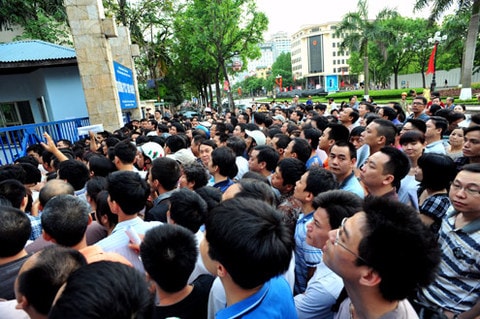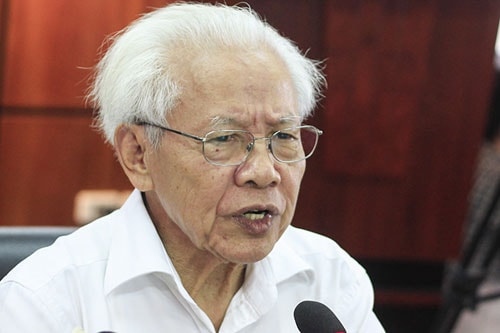A father's experience when his child studies at Experimental School
Professor Ho Ngoc Dai's Experimental Program does not teach children to imitate but to think logically, to discover and apply rules.
Having a child studying at Experimental School, the school founded by Professor Ho Ngoc Dai, Mr. Vu Ngoc Han shares some experiences.
The first time I heard about the Experimental School was when my eldest child participated in the English Olympiad at the primary school level. Many students from the Experimental School made it to the second round of the competition and achieved high scores. That was in 2006. The second time I heard about this school was when an acquaintance of my wife complained about her son who was studying at the Experimental School “arguing with his parents” and decided to transfer him to another school because the school “encouraged children to argue with their parents”.
Curious about this novelty, I learned about the school and decided to let my youngest child attend. That was in 2010, the same year that Professor Ngo Bao Chau won the Field Award. That year, the professor came to the Experimental School to attend the opening ceremony. After this event, the interest of parents in the Experimental School skyrocketed and two years later (in 2012), there was an incident where parents broke down the gate to ask for their children to enter the school. Commenting online, many people asked the question: if so many people were interested, why not let this model develop. Perhaps that is why the Ministry of Education and Training and the provinces and cities have expanded the model in the following years.
|
Parents jostle to buy application forms for their children to enter Experimental School (Ba Dinh, Hanoi) in 2012. Photo:Yellow River |
My child left the school three years ago, but my good impression of the school has not diminished. Let me share some stories of his time at the school and after. First is about learning letters and spelling. The spelling is very new and has been a topic of debate recently. As an insider, I can confirm that my child is very satisfied with the school's spelling. There are some local words, which may have been chosen because they are unique, not because the person who made the books is from that area. Many of the readings in the Vietnamese books are very good.
Then there is the difference in math. When I was in high school, I only knew the decimal number system. When I went to university, I learned the binary number system (base 2) and the number system of base 8 and base 16 used in computers. But since elementary school, my child has been taught the number system with any base (two, three, four...). And he also did very well, contrary to concerns about the complexity beyond the child's ability to absorb.
From the above two experiences and some others, I realized that the intention of the program is not to teach children to imitate but to teach children to think logically, to discover rules and apply rules. This is something I highly appreciate, but I also have to comment that with this very new program, not many parents will be able to understand it to tutor their children at home. The school does not encourage students to "argue with their parents" but encourages them to have and defend their own opinions.
A pretty clear illustration is what happened in 4th grade. There was a subject teacher who gave homework to the children, asked them to do it on paper and submit it to her. The children completed the task but when they turned it in, they couldn’t find the teacher in the teacher’s room so they asked another teacher there to deliver it for them. But that teacher left the homework in the room and forgot.
The teacher of the class thought that the class did not do their homework, so she decided to punish the whole class by making them run and write a self-criticism. Disagreeing with the teacher, the whole class went to the principal's office to complain. The principal called the teacher to listen to both sides and decided that the students were not at fault, and the teacher had to revoke the punishment. This certainly cannot happen in public schools, where the teacher's authority is absolute.
At the end of each school year, the school organizes a fair, requiring parents to give their children a certain amount of money so that they can trade with each other. In the first three years, my child used the money his parents gave him to buy a food item and a toy he liked. In fourth grade, my child brought a lot of corks that he used to play tag and marbles at home, and he sold all of them to the children in the lower grades.
In 5th grade, I drew a series of pictures of sailboats with pirate flags. The day before the fair, I brought them out to the class to auction. One painting fetched 80,000 VND, another 40,000 VND, and the others were bid between 10,000 and 30,000 VND. But the children didn’t have any money, so the sale had to wait until the next day for it to actually happen.
In the evening, when I heard my child tell the story, I guessed that many children would be scolded by their families for using money to buy a painting drawn by a friend. But the next day, only one friend withdrew, the rest bought paintings and my child earned more than 100 thousand dong. Actually, my child is not a cunning person, only for money, but simply loves to draw, especially pirate ships. The idea of an auction must have been something he read somewhere and tried to apply.
I think that children who buy paintings are not “chickens” but the opposite. In grade 5, children are aware of the value of money, so we need to understand that they are people who dare to do and spend money to own what they like. Experience shows that those who dare to do are those who have a high chance of success in the future. Whether they win or lose money, they “win” because they have valuable experiences.
|
Professor Ho Ngoc Dai, book editorVietnamese Grade 1 Educational Technology, founder of the Experimental School. Photo:Duong Tam |
I don’t know if it’s because of the early logical thinking lessons at the Experimental School, but sometimes my child asks or makes comments that show very good thinking ability. In 6th grade, he asked how the first life was formed? Why do living things want to live? Last summer, he told me, “If all experimental conditions are repeated, the dice when rolled will always give a fixed result.”
What he said was contrary to the common law, rolling dice will give equal probability of appearing sides so I think he simply did not understand about probability. I explained to him for a while but then he was still stubborn "What I mean is if all the conditions are repeated...". I told him again about the random motion of molecules, atoms, about the uncertainty principle and concluded that it is impossible for the conditions to be repeated. But once again he said "It is difficult to repeat but if it is repeated then...".
At this point, I had to think again and admit that my child was right. If the conditions could be repeated, the dice roll would always give a fixed result. It could also be that it was just his natural tendency to develop and not because of the Experimental program. But I am very happy that I chose for my child a learning environment suitable for the development of those tendencies. Since people have been talking a lot about the experimental program recently, I would like to share some personal experiences about the program. If I could choose again, I would definitely choose the experimental program for my child.



